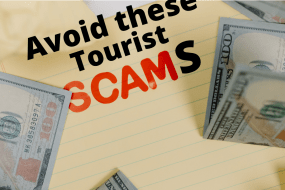
Introduction
Welcome to our comprehensive guide on safeguarding yourself from the deceptive practices of the Fake Travel Ticket Scam. As dedicated travelers ourselves, we understand the significance of ensuring a seamless and stress-free journey. Unfortunately, scammers are continually devising new methods to exploit unsuspecting tourists. In this article, we will delve into the intricate details of the Fake Travel Ticket Scam, providing you with valuable insights, precautions, and actionable tips to protect your travel plans.
Understanding the Fake Travel Ticket Scam
What Constitutes the Fake Travel Ticket Scam?
The Fake Travel Ticket Scam encompasses the creation and sale of counterfeit or non-existent travel tickets to unsuspecting travelers. Exploiting the enthusiasm and trust of individuals seeking cost-effective travel options, scammers entice victims with alluring offers, discounted prices, or exclusive deals on flights, trains, or other modes of transportation. However, once payment is made, victims receive either fake or invalid tickets, resulting in substantial financial loss and travel disruption.
Unraveling the Scammers' Tactics
Scammers employ various channels, including online platforms, classified advertisements, social media, and even in-person interactions, to carry out their fraudulent activities. Utilizing professional-looking websites and persuasive marketing strategies, they create an illusion of legitimacy. During the booking process, victims may be coerced into sharing personal and financial information, which can subsequently be exploited for identity theft or further fraudulent endeavors.
Identifying Warning Signs of a Fake Travel Ticket
Detecting a counterfeit travel ticket can be challenging, given scammers' growing sophistication. Nonetheless, several indicators can help you spot a potential scam:
- Unbelievable Prices: Exercise caution when encountering excessively low prices that appear too good to be true, as scammers frequently employ this tactic to entice victims.
- Unprofessional Websites: Scrutinize the credibility of travel agencies or ticket providers. Websites with subpar design, lack of contact information, or grammatical errors may indicate a potential scam.
- Secure Payment Methods: Ensure that the payment process occurs through secure channels. Refrain from sharing sensitive information on unencrypted websites or insecure payment platforms.
- Lack of Confirmation or E-Ticket: Legitimate travel bookings generally provide instant confirmation or e-tickets. If you encounter delays or receive excuses regarding ticket delivery, exercise caution and scrutinize the situation further.
- Inconsistent or Suspicious Communication: Pay close attention to the communication you receive from ticket providers. Spelling errors, unprofessional emails, or vague responses should raise suspicions.
Safeguarding Yourself against the Fake Travel Ticket Scam
Prioritize Research and Verification
Before finalizing any travel bookings, invest ample time in conducting thorough research and verification. The following guidelines will help protect you:
- Establish Credibility: Research the reputation of travel agencies or ticket providers. Seek out reviews, ratings, and firsthand experiences shared by fellow travelers. Valuable insights can be found on trusted online travel forums.
- Verify Contact Information: Confirm the authenticity of provided contact information, including phone numbers, email addresses, and physical addresses. Only proceed with transactions once you have confirmed their legitimacy.
- Scrutinize Pricing: Compare ticket prices with those offered by established travel providers. If the prices appear significantly lower, exercise caution and delve deeper into the matter.
Implement Secure Online Booking Practices
When making online travel ticket bookings, adopt the following practices to minimize the risk of falling victim to the Fake Travel Ticket Scam:
- Choose Trusted Platforms: Opt for reputable travel websites and well-known booking platforms that have a proven track record of reliability and security.
- Utilize Secure Payment Channels: Make use of secure payment gateways that encrypt your financial information. Look for the padlock symbol in the browser address bar, ensuring a secure connection.
- Double-Check Website Security: Verify the website's security measures by ensuring it utilizes HTTPS protocol, indicating an encrypted and secure connection.
Frequently Asked Questions (FAQs)
What should I do if I suspect I have purchased a fake travel ticket?
If you suspect you have bought a counterfeit travel ticket, follow these steps:
- Contact the Ticket Provider: Reach out to the ticket provider immediately to voice your concerns and request a resolution.
- Notify Your Payment Provider: If you made the payment through a credit card or other payment platforms, contact your payment provider to report the fraud and seek assistance.
- File a Complaint: Lodge a formal complaint with relevant consumer protection agencies or travel regulatory bodies to raise awareness about the scam.
Are all cheap travel tickets fake?
Not all cheap travel tickets are fake; however, it is crucial to exercise caution when encountering unbelievably low prices. Thoroughly research the provider's credibility and verify the authenticity of the tickets before making any payments.
Can I get a refund if I have purchased a fake travel ticket?
Obtaining a refund for a fake travel ticket can be challenging, as scammers often operate anonymously. However, it is recommended to contact the ticket provider, your payment provider, and relevant authorities to report the fraud and explore potential remedies.
How can I protect my personal and financial information during online ticket bookings?
To safeguard your personal and financial information during online ticket bookings:
- Use Trusted Websites: Stick to reputable travel websites and platforms that prioritize security and data protection.
- Verify Website Security: Look for the padlock symbol and “https://” in the website URL to ensure a secure and encrypted connection.
- Avoid Public Wi-Fi: Refrain from making bookings or sharing sensitive information while connected to public Wi-Fi networks, as they may be vulnerable to hackers.
Are there any legal actions I can take against fake ticket scammers?
Legal actions against fake ticket scammers can vary depending on the jurisdiction and the circumstances of the scam. It is advisable to consult with legal professionals or consumer protection agencies to understand your rights and explore available legal remedies.
Conclusion
Protecting yourself from the Fake Travel Ticket Scam requires diligence, awareness, and thorough research. By understanding the tactics employed by scammers and implementing secure booking practices, you can significantly reduce the risk of falling victim to this fraudulent scheme. Stay vigilant, prioritize verification, and rely on trusted sources to ensure your travel plans remain intact and hassle-free. Safe travels!










